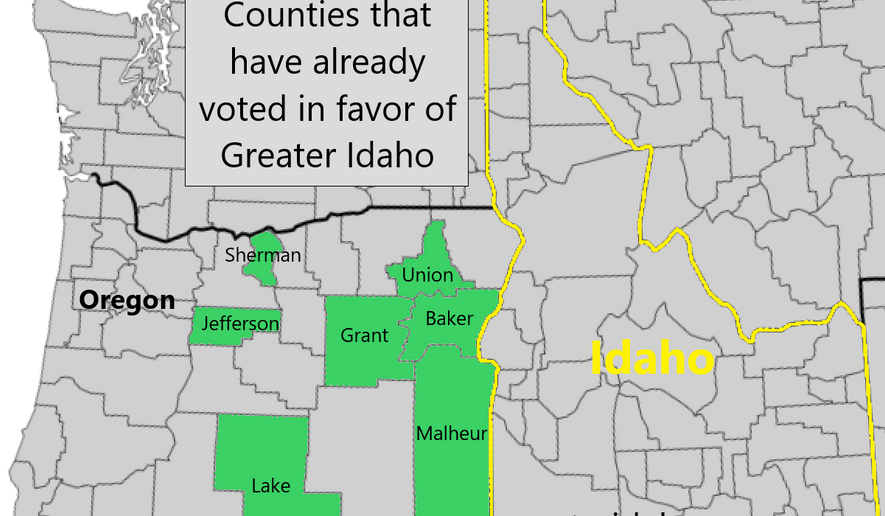A newly released poll shows that Oregonians are divided on Greater Idaho, the campaign to permit willing rural Oregon counties to join their red-state neighbor to the east.
In the first poll of its kind, the Oregon Values and Beliefs Center found Greater Idaho foes outnumbered fans, but just barely: 42% of the 1,400 adults surveyed online opposed allowing counties to move from Oregon to Idaho, while 38% backed the idea and 20% were uncertain.
“In explaining their opposition to the counties leaving, Oregonians voice concerns about breaking up the state, citing their pride in being an Oregonian, and the value of a diversity of opinions,” said the Portland-based research center in its analysis of the poll conducted June 8-14.
Opposition to the Greater Idaho proposal was greatest in the Portland tri-county area, where 44% disagreed with allowing counties to switch states if their voters approved, while 35% favored the proposal.
The reverse was true outside Portland and the Willamette Valley: The rest of the state supported the Greater Idaho proposal by 44% to 40%, according to the poll, which had error margins ranging from 1.6 to 2.6 percentage points for the various sample groups.
Journalists’ main narrative has been that Greater Idaho will never happen because Oregon won’t allow it. Newly released poll results show that there’s no majority opposed (or in favor), and people are still undecided. https://t.co/QDhfneEzqy
— Citizens for Greater Idaho (@GreaterIdaho) July 2, 2021
Seven rural Oregon counties have already voted in favor of ballot initiatives requiring county officials to study or pursue joining Idaho, driven by the growing urban-rural divide between deep-blue Portland, the state’s population center, and the more conservative eastern and southern counties.
Mike McCarter, president of Citizens for Greater Idaho, said Monday he was encouraged by the findings.
“Journalists have been asserting that we don’t have much chance of convincing Oregon to let these counties go. But this poll seems to show that there is not a majority opposed to letting them go,” said Mr. McCarter in a statement. “As a new movement introducing a new idea, we feel that’s pretty good. As people learn about the benefits of letting these counties go, their representatives will become more persuadable.”
In his experience, he said, rural Oregon voters are more likely to support the idea after receiving campaign literature and reading op-eds on both sides of the issue.
The five rural counties that voted in favor of the Greater Idaho initiative in May backed the plan with an average support level of 62%, the group said.
“Citizens for Greater Idaho expects to continue to win elections in rural Oregon in this way,” the organization said.
The poll also found that, regardless of their opinions on the matter, 64% of Oregonians said that such a border switch was unlikely, while 43% said it would hurt the departing counties.
Non-White Oregonians were more likely to favor the idea, with 42% expressing support, while 43% of White Oregonians opposed an Oregon-to-Idaho exodus.
Greater Idaho said it plans to hold a meet-and-greet on Saturday at the Powderhaus Brewing Company in Boise, the first such event to be held in Idaho, featuring Idaho state Rep. Barbara Ehardt and former Oregon House Speaker Mark Simmons.
Next on Greater Idaho’s list is Crook County, where the organization plans to descend on the Aug. 4 meeting “to confront county commissioners on their reluctance to refer a non-binding advisory question to the November 2021 ballot,” said the group.
Certainly Greater Idaho has its work cut out for it: Moving Oregon counties to Idaho (or any part of an existing state to another one) would require the approval of both state legislatures and the U.S. Congress.
Idaho Gov. Brad Little, a Republican, has welcomed Oregonians seeking to become Idahoans while acknowledging that the effort to relocate counties is a long shot.
“I understand why many people want to be Idahoans. They’re looking at Idaho fondly because of our strong economy, regulatory atmosphere, and our values,” he said in a June 3 statement to KREM-TV in Salem. “Still, the decision to change Idaho and Oregon’s borders would need to go through both states’ legislatures and the U.S. Congress for approval. There’s a lot that needs to happen before moving the border is within the realm of possibility.”
• Valerie Richardson can be reached at vrichardson@washingtontimes.com.




Please read our comment policy before commenting.